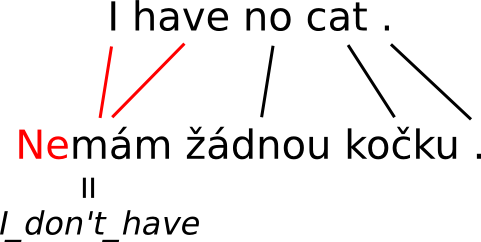MT that Deceives: Difference between revisions
Jump to navigation
Jump to search
No edit summary |
No edit summary |
||
| Line 3: | Line 3: | ||
In some cases, this approach leads to '''systematic errors'''. | In some cases, this approach leads to '''systematic errors'''. | ||
[[File:nemam_kocku.png]] | [[File:nemam_kocku.png|thumb|300px|'''Example of an error during phrase extraction.''' The system learns a translation pair ''"nemám" = "I have"'' which has the opposite meaning.]] | ||
Revision as of 11:45, 3 November 2014
Many popular MT systems, such as Google Translate or Bing Translator (for certain languages), are based purely on statistical models. Such models observe word and phrase co-occurrences in parallel texts and try to learn translation equivalents.
In some cases, this approach leads to systematic errors.
